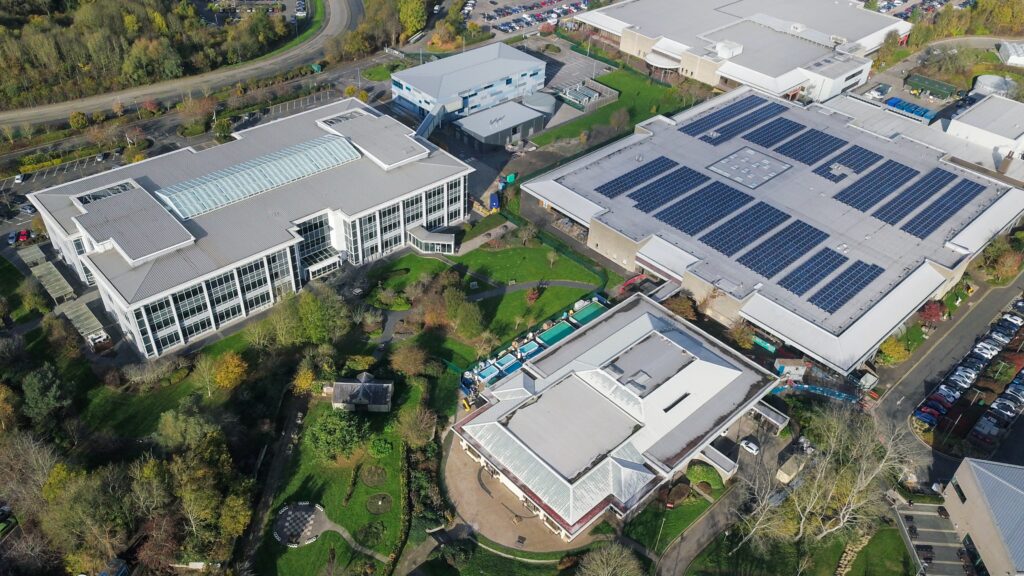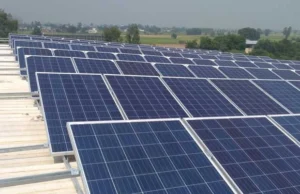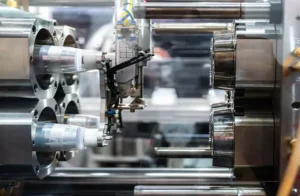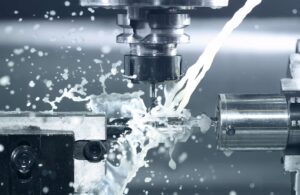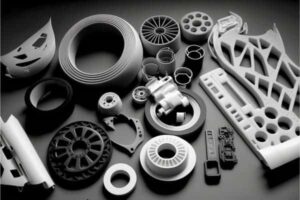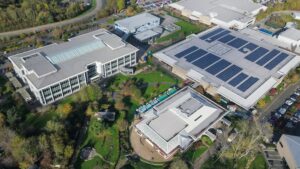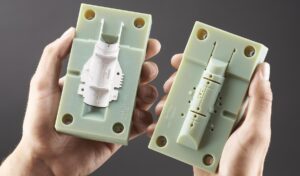Commercial solar EPC is reshaping how Indian industries manage power costs and sustainability. With rising tariffs and global green demands, factories and warehouses are adopting large-scale solar EPC to cut expenses and secure reliable energy.
Manufyn leads this shift with end-to-end EPC solutions for factories, warehouses, and manufacturing plants. From design to installation, Manufyn helps businesses lower costs, boost efficiency, and transition to clean, sustainable energy.
Why Commercial & Industrial Solar EPC Is Growing in India
The demand for commercial solar EPC in India is rising as businesses seek cost savings, sustainability, and energy security. From policy incentives to falling technology costs, multiple factors are driving industries toward industrial solar EPC projects as a long-term strategy.
- Rising Energy Costs
Industries face mounting electricity bills that reduce margins. Adopting industrial solar EPC projects helps offset expenses, lower operational costs, and secure long-term energy independence. - Government Policy Support
Incentives like subsidies, accelerated depreciation, and net-metering make solar viable. Many solar EPC for factories projects now achieve payback in just a few years, turning costs into investments. - Global Supply Chain Demands
ESG compliance pushes businesses to cut carbon footprints. Rooftop EPC for industries and warehouse solar EPC projects help companies meet sustainability standards while staying competitive. - Falling Technology Costs
Cheaper solar panels, inverters, and storage make large-scale solar EPC projects more affordable. Businesses can now expand from rooftop setups to multi-megawatt ground-mounted plants. - Energy Security
Fluctuating grid tariffs and power cuts disrupt operations. Solar EPC for manufacturing plants ensures reliable, renewable power that stabilizes production schedules and reduces risks. - Corporate Branding
Adopting commercial solar EPC boosts reputation with clients and investors. Sustainability reports increasingly showcase renewable energy adoption as a sign of corporate responsibility. - National Renewable Goals
India targets 500 GW of renewable energy by 2030. Rooftop EPC for industries and ground-mounted projects are vital contributions, with industries stepping up to meet this ambition. - Manufyn’s Role
Manufyn delivers tailored industrial solar EPC solutions aligned with India’s renewable roadmap. With expertise in solar and green hydrogen, it ensures clients are future-ready in the energy transition.
Key Benefits of Commercial & Industrial Solar EPC for Industrial Applications
Adopting commercial solar EPC is now a strategic necessity for Indian industries. From factories to warehouses, well-executed industrial solar EPC projects bring cost savings, energy security, sustainability, and stronger competitiveness.
1. Cost Savings and ROI
Solar EPC for factories and warehouses cuts energy costs by 40–60%. With lower equipment prices and incentives, ROI comes in 3–5 years, while panels provide 25+ years of reliable, near-free power after breakeven.
2. Energy Independence
Grid reliance exposes firms to tariff hikes and supply risks. Warehouse solar EPC and large-scale solar EPC generate onsite power, while hybrid systems balance solar and grid, ensuring stability for critical manufacturing loads.
3. Sustainability and Compliance
Adopting solar EPC for manufacturing plants helps meet ESG norms, cut carbon footprints, and strengthen ties with eco-focused buyers. It ensures compliance with sustainability mandates and enhances global competitiveness.
4. Operational Efficiency
Unreliable grid supply can halt factory operations. Commercial solar EPC minimizes downtime, especially in energy-intensive sectors like steel, textiles, and chemicals, where even brief disruptions cause major financial losses.
5. Tax Benefits and Incentives
Investing in industrial solar EPC unlocks tax benefits such as accelerated depreciation, GST input credits, and government subsidies. These reduce upfront costs and accelerate ROI for both rooftop and ground-mounted projects.
6. Brand and Investor Confidence
By adopting warehouse solar EPC or solar EPC for factories, companies showcase green initiatives. This boosts brand reputation, attracts eco-conscious investors, and builds trust with customers and global supply chain partners.
Manufyn offers end-to-end support, from system design to project execution, ensuring businesses maximize these benefits. With global supplier networks and ISO-certified standards, Manufyn’s expertise in large-scale solar EPC projects and solar EPC for manufacturing plants ensures that cost savings, sustainability, and operational efficiency go hand in hand.
Commercial & Industrial Solar EPC: Rooftop EPC for Industries vs. Ground-Mounted Solar EPC Projects
Choosing the right model of commercial solar EPC is crucial for maximizing efficiency and returns. While both rooftop EPC for industries and ground-mounted solar EPC projects serve the same purpose, delivering cost-effective renewable energy, their applications vary based on space, demand, and business requirements.
Rooftop EPC for Industries
For factories, warehouses, and institutions with idle roof space, rooftop EPC for industries offers a smart way to turn unused infrastructure into an energy-generating asset. Large warehouse roofs, for example, are ideal for warehouse solar EPC, allowing businesses to meet a significant portion of their energy needs without investing in additional land.
The benefits of rooftop installations include:
- Efficient utilization of existing space.
- Faster installation timelines compared to ground-mounted setups.
- Lower capital investment, as no separate land acquisition is required.
- Direct contribution to operational sustainability targets.
For solar EPC for factories, rooftops are often sufficient to cover day-to-day energy requirements, especially when paired with net-metering policies that allow excess power to be fed back into the grid.
Ground-Mounted Solar EPC Projects
On the other hand, large-scale solar EPC projects typically require dedicated land and are well-suited for industries with very high power demands. Manufacturing clusters, steel plants, or automotive facilities often prefer ground-mounted setups because they provide scalability, from 1 MW to hundreds of MWs depending on requirements.
Advantages of ground-mounted projects include:
- Flexibility in panel orientation for maximum sunlight capture.
- Ability to scale capacity as energy demand grows.
- Reduced dependency on roof structural strength or maintenance.
- Long-term reliability with dedicated infrastructure.
For energy-intensive businesses, solar EPC for manufacturing plants often integrates ground-mounted projects with storage systems, ensuring uninterrupted supply during peak demand hours.
Hybrid Approach for Maximum Efficiency
Some industries combine both rooftop EPC for industries and ground-mounted systems. For example, a warehouse may use rooftop solar for day-to-day operations while relying on ground-mounted capacity for large-scale backup. This hybrid model allows businesses to balance cost, space, and energy demand effectively.
Manufyn specializes in feasibility studies that map out a company’s consumption patterns, available space, and long-term requirements. By comparing rooftop and ground-mounted models, Manufyn ensures that businesses choose the most efficient and cost-effective solution.
Whether it’s warehouse solar EPC for distribution hubs or large-scale solar EPC projects for industrial clusters, the right model depends on careful planning.
Commercial & Industrial Solar EPC for Factories, Warehouses, and Manufacturing Plants
India’s factories, warehouses, and manufacturing plants are energy-intensive. Adopting commercial solar EPC helps cut costs, reduce emissions, and boost reliability with solutions tailored to each facility’s energy needs.
Solar EPC for Factories
Factories run round the clock, consuming heavy power. Solar EPC for factories offsets costs with renewable energy, while rooftop EPC for industries ensures compliance, savings, and stable costs for over 25 years.
Warehouse Solar EPC
Warehouses have vast rooftops perfect for solar. Warehouse solar EPC turns unused space into clean energy, cutting power bills and powering logistics, while boosting ESG credentials and building green supply chain partnerships.
Solar EPC for Manufacturing Plants
Energy-heavy plants in steel, cement, textiles, or chemicals benefit from solar EPC for manufacturing plants with hybrid models. Large-scale solar EPC delivers MW-level energy security, stability, and environmental compliance.
Customized EPC Designs for Industries
Each industrial facility has unique energy requirements, which means commercial solar EPC solutions must be customized. For example:
- A food processing unit may need rooftop setups combined with temperature control systems.
- A logistics warehouse may prioritize rooftop EPC with net-metering.
- A heavy manufacturing plant may require ground-mounted industrial solar EPC for higher capacity.
Manufyn leverages its expertise to deliver tailored EPC layouts, ensuring maximum efficiency. Whether it’s warehouse solar EPC for idle spaces or solar EPC for factories with round-the-clock needs, Manufyn designs projects that balance cost savings, compliance, and scalability.
Operational and Environmental Impact
By implementing commercial solar EPC, industries directly reduce downtime risks, operational costs, and carbon emissions. These improvements are not just financial, they strengthen corporate sustainability reports, improve investor confidence, and contribute to India’s renewable energy targets.
Commercial & Industrial Solar EPC: Large-Scale Industrial Solar EPC Projects in India
Large-scale industrial solar EPC projects are transforming India’s energy landscape. Unlike small rooftop setups, they power factories and warehouses with megawatt-scale systems, delivering cost savings, energy stability, and sustainability at scale.
- Rising Demand
Commercial solar EPC in India is expanding with large-scale solar EPC projects for sectors like steel, cement, textiles, and automotive. With capacities from 1 MW to hundreds, they meet high industrial electricity needs. - Scalability for High Energy Demands
Industrial solar EPC using ground-mounted or hybrid systems suits factories consuming megawatts daily. Businesses can start small and expand capacity, making solar EPC for manufacturing plants adaptable and future-ready. - Contribution to India’s Renewable Targets
India targets 500 GW of renewable energy by 2030. Large-scale ground-mounted projects and rooftop EPC for industries allow factories to align with this mission while cutting costs and emissions. - Financial Models and PPAs
Upfront costs challenge adoption of large solar EPC projects. Models like PPAs let businesses pay only for consumed power, while developers manage installation and upkeep, making warehouse solar EPC affordable.
- Competitiveness and Cost Reduction
Industrial solar EPC reduces electricity costs, boosting global competitiveness. For energy-heavy sectors like steel and cement, solar EPC for factories ensures savings while maintaining production efficiency.
- Quality and Certification
Global supply chains demand quality compliance. ISO-certified execution in large-scale solar EPC projects ensures global benchmarks. Manufyn guarantees solar EPC for manufacturing plants meet strict standards.
- Manufyn’s Role in Large-Scale EPC
Manufyn executes hybrid models, combining rooftop EPC for smaller sites with large-scale EPC for plants. With integration of green hydrogen, Manufyn ensures industries are prepared for next-gen renewable transitions.
Commercial & Industrial Solar EPC: Manufyn’s Industrial Solar EPC Capabilities
Manufyn has established itself as a trusted partner for businesses transitioning to renewable energy through commercial solar EPC. With deep expertise in both manufacturing and renewable energy, Manufyn delivers end-to-end solutions that address the unique challenges of industrial clients.
From design and procurement to execution and maintenance, the company ensures seamless delivery of industrial solar EPC projects tailored to business needs.
- Comprehensive EPC Services
Manufyn provides full-spectrum services, covering site analysis, design, procurement, installation, and after-sales maintenance. Whether it’s solar EPC for factories, warehouse solar EPC, or large industrial plants, every project is managed with precision. Clients benefit from a consultative approach where energy demand, space utilization, and cost structures are carefully evaluated before implementation.
- Supplier Network and Quality Assurance
One of Manufyn’s strengths lies in its robust supplier ecosystem. With partnerships across ISO-certified manufacturers, Manufyn sources the best-in-class components for rooftop EPC for industries and large-scale solar EPC projects. Rigorous quality checks are carried out at each stage, ensuring that systems deliver reliable performance for decades.
- Flexibility Across Project Types
Different industries have varying requirements, and Manufyn offers flexible solutions that cover all models of commercial solar EPC. From rooftop setups for warehouses to ground-mounted solar EPC for manufacturing plants, Manufyn tailors each solution to align with energy demand and available space. For businesses looking to maximize efficiency, hybrid projects that combine rooftop and ground-mounted systems are also offered.
- Integration with Future Energy Solutions
Manufyn is not limited to today’s solar requirements, it is actively exploring integration with next-generation energy solutions like green hydrogen. For industries adopting industrial solar EPC, this forward-looking approach ensures long-term sustainability and future-proofing against changing energy policies.
- Project Management Expertise
Large-scale installations require strict control over costs, quality, and timelines. Manufyn brings strong project management oversight, ensuring every solar EPC for factories, warehouse, or plant is executed smoothly. With global exposure and an understanding of local challenges, the company bridges international best practices with Indian industry needs.
By combining dual expertise in manufacturing and renewable energy, Manufyn ensures businesses gain more than just savings, they gain a reliable partner in sustainability. Whether it’s a small-scale rooftop EPC for industries or multi-megawatt large-scale solar EPC projects, Manufyn delivers consistent, world-class results.
Commercial & Industrial Solar EPC: Case Studies of Industrial Solar EPC Success
The impact of commercial solar EPC can best be understood through real-world applications. Across factories, warehouses, and manufacturing plants, industries are saving costs, improving energy reliability, and meeting sustainability goals through carefully executed projects. Manufyn has been instrumental in delivering successful industrial solar EPC installations that highlight the benefits of renewable adoption.
- Factory Case Study
A mid-sized textile factory in India partnered with Manufyn to implement a 1 MW solar EPC for factories project. By installing rooftop panels integrated with grid supply, the company reduced electricity costs by 40%. Within four years, the factory achieved full payback while strengthening its compliance with ESG standards. The project not only reduced expenses but also elevated the factory’s reputation among global buyers.
- Warehouse Case Study
A logistics hub implemented warehouse solar EPC on its expansive idle rooftop. With a 750 kW system, the warehouse achieved near energy independence for operations like lighting, refrigeration, and equipment handling. The switch enhanced its role in global green supply chains, as partners valued the sustainability credentials added by adopting commercial solar EPC solutions.
- Manufacturing Plant Case Study
A steel manufacturing plant required uninterrupted power for high-load operations. Manufyn deployed a hybrid model combining large-scale solar EPC projects with storage backup. The system generated over 5 MW of power, significantly cutting dependency on volatile grid pricing. This solar EPC for manufacturing plants reduced annual energy costs by millions while contributing to India’s renewable energy targets.
- Global Case Studies
Beyond India, Manufyn’s network has replicated similar strategies in international markets. Companies worldwide benefit from industrial solar EPC by reducing costs, improving sustainability scores, and enhancing long-term competitiveness. These proven models can be adapted for industries across India, ensuring reliable execution and global best practices.
- Manufyn’s Approach
The success of these projects highlights Manufyn’s consultative approach, custom designs, vetted suppliers, and strong project management. Whether delivering rooftop EPC for industries or large-scale solar EPC projects, Manufyn ensures results that balance cost, sustainability, and operational efficiency.
Commercial & Industrial Solar EPC: Steps to Start Your Industrial Solar EPC Project
Implementing commercial solar EPC in factories, warehouses, or manufacturing plants can seem complex, but a structured approach ensures smooth execution. By following clear steps, industries can maximize cost savings, energy efficiency, and sustainability impact while avoiding common pitfalls in industrial solar EPC projects.
Step 1: Conduct an Energy Audit
Begin with a comprehensive assessment of your facility’s energy consumption. For solar EPC for factories and warehouse solar EPC, understanding peak loads, daily consumption patterns, and operational requirements is critical. This audit forms the foundation for designing an efficient solar system.
Step 2: Feasibility Study
Next, evaluate the available space and structural suitability. Rooftop EPC for industries requires assessing roof strength and shading patterns, while large-scale solar EPC projects may need dedicated land. Manufyn provides detailed feasibility studies to ensure optimal placement and energy output.
Step 3: Customized EPC Design
Based on energy audits and feasibility reports, a tailored design is created. Solar EPC for manufacturing plants often involves hybrid solutions, integrating rooftop and ground-mounted systems with grid or storage backups. Custom designs ensure maximum ROI and seamless energy integration.
Step 4: Procurement of High-Quality Components
Selecting the right panels, inverters, and mounting systems is essential for long-term performance. Industrial solar EPC requires ISO-certified equipment to guarantee efficiency and durability. Manufyn leverages its global supplier network to source premium components for both rooftop EPC for industries and warehouse solar EPC.
Step 5: Execution and Installation
Professional installation ensures safety, compliance, and performance. Whether it’s solar EPC for factories or large-scale solar EPC projects, expert project management guarantees timely execution while adhering to industry standards.
Step 6: Monitoring & Maintenance
After installation, continuous monitoring and regular maintenance are crucial. This ensures the commercial solar EPC system operates at peak efficiency and delivers promised savings over its lifetime. Advanced monitoring tools allow tracking energy generation and quickly resolving any issues.
Step 7: Performance Evaluation
Regular assessment of ROI, energy output, and sustainability impact helps industries optimize future solar investments. This final step ensures that solar EPC for manufacturing plants continues to deliver value while aligning with ESG goals.
By following these steps, businesses can implement industrial solar EPC confidently and effectively. Manufyn’s consultative approach supports clients through each phase, from energy audits to long-term performance monitoring, ensuring cost-effective and sustainable energy solutions.
Commercial & Industrial Solar EPC: The Future of Solar EPC for Businesses in India
The adoption of commercial solar EPC is no longer optional, it has become a strategic investment for Indian businesses. As electricity tariffs rise and global sustainability standards tighten, factories, warehouses, and manufacturing plants are turning to industrial solar EPC to secure energy independence, reduce costs, and strengthen their environmental credentials.
- Strategic Benefits for Industries
By implementing solar EPC for factories, businesses achieve predictable energy costs and minimize exposure to grid fluctuations. Rooftop EPC for industries and warehouse solar EPC allow efficient use of idle spaces, while large-scale solar EPC projects provide high-capacity solutions for heavy-load manufacturing plants.
Collectively, these strategies enable companies to meet operational demands while contributing to India’s renewable energy targets.
- Sustainability and ESG Compliance
Corporate responsibility increasingly requires transparency in energy sourcing. Solar EPC for manufacturing plants directly supports ESG reporting, helping companies showcase carbon reduction and renewable adoption. Industries embracing commercial solar EPC not only cut costs but also enhance investor confidence and global competitiveness.
- Innovation and Future Readiness
Manufyn is leading the way by integrating next-generation solutions like green hydrogen alongside industrial solar EPC projects. This future-oriented approach ensures businesses are prepared for evolving energy policies and emerging sustainability requirements. Hybrid models combining rooftop EPC for industries with large-scale solar EPC projects further optimize efficiency and maximize returns.
- Partnering with Experts
Choosing the right partner is key. Manufyn’s end-to-end expertise, from design and procurement to installation, monitoring, and maintenance, ensures that companies achieve long-term energy savings, operational reliability, and environmental impact. With global standards, ISO-certified components, and proven project management, Manufyn provides comprehensive support for every industrial solar initiative.
In conclusion, commercial solar EPC represents a transformative opportunity for India’s industrial sector. Factories, warehouses, and manufacturing plants adopting these solutions are not just saving costs, they are future-proofing operations, enhancing brand value, and contributing meaningfully to a greener, more sustainable India.
FAQs: Commercial & Industrial Solar EPC
1. What is commercial solar EPC and how does it work?
Commercial solar EPC involves the design, procurement, and installation of solar energy systems for businesses. It includes industrial solar EPC solutions for factories, warehouses, and manufacturing plants, providing on-site renewable power that reduces electricity costs and ensures operational reliability.
2. How is industrial solar EPC different from residential solar solutions?
Unlike residential solar, industrial solar EPC is designed for high-load facilities. It includes solar EPC for factories, warehouse solar EPC, and large-scale solar EPC projects, which handle substantial energy consumption and integrate with backup or grid systems for uninterrupted operations.
3. What are the cost benefits of solar EPC for factories and warehouses?
By implementing commercial solar EPC, factories and warehouses can save 40–60% on energy bills. Systems like rooftop EPC for industries and warehouse solar EPC offer long-term ROI, tax incentives, and depreciation benefits, making solar a financially attractive investment.
4. How much space do I need for rooftop EPC in an industrial setup?
For rooftop EPC for industries, the space requirement depends on energy demand. Large warehouses with expansive roofs are ideal for warehouse solar EPC, while factories may require hybrid designs combining rooftop and large-scale solar EPC projects for optimal energy output.
5. Can solar EPC projects run 24/7 operations for manufacturing plants?
Yes, solar EPC for manufacturing plants can be integrated with grid power or storage solutions to ensure uninterrupted operations. Commercial solar EPC systems provide reliable energy for high-load industries, reducing downtime and increasing operational efficiency.
6. What is the typical ROI period for industrial solar EPC in India?
Most industrial solar EPC projects, including solar EPC for factories and warehouse solar EPC, achieve ROI within 3–5 years. Long-term benefits include over 25 years of energy generation, operational savings, and compliance with sustainability goals.
7. Does Manufyn handle both rooftop and ground-mounted solar EPC projects?
Yes, Manufyn specializes in commercial solar EPC, offering rooftop EPC for industries, large-scale solar EPC projects, and hybrid models. The approach ensures optimal energy generation tailored to the client’s space, load requirements, and budget.
8. How does Manufyn ensure quality in solar EPC execution?
Manufyn uses ISO-certified suppliers and rigorous quality checks throughout industrial solar EPC projects. From solar EPC for manufacturing plants to warehouse solar EPC, every installation is monitored for performance, safety, and compliance with international standards.
9. Can solar EPC be integrated with other renewable solutions like green hydrogen?
Yes, forward-looking commercial solar EPC projects can integrate with green hydrogen systems. Industrial solar EPC solutions, such as large-scale solar EPC projects, are being combined with next-gen renewable technologies to future-proof energy infrastructure.
10. How do I start my solar EPC project with Manufyn?
Starting a commercial solar EPC project is simple. Manufyn provides energy audits, feasibility studies, customized solar EPC for factories, rooftop EPC for industries, and warehouse solar EPC designs. From procurement to installation and monitoring, Manufyn offers end-to-end guidance for seamless implementation.
